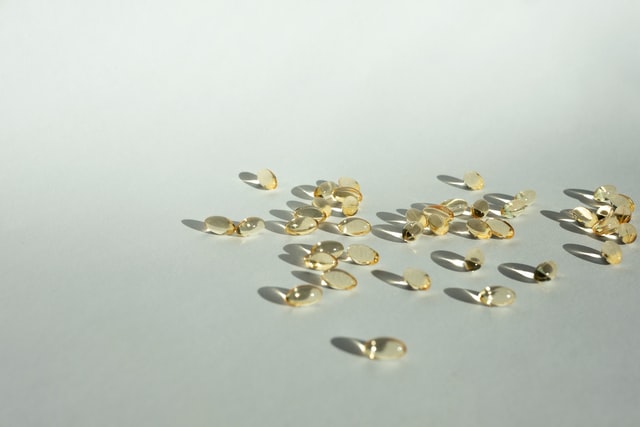Introduction
In this blog post, we will discuss vitamin D and some of the benefits that it has for your health. Did you know that vitamin D is actually a hormone? Most people don't realize this fact but vitamin D plays a large role in many different bodily functions! Vitamin D (or vitamin D3 - both of which are used interchangeably) can be used to help prevent diseases like cancer in addition to treating conditions such as arthritis and depression. Read on to find out more about vitamin D and how it can benefit your life!
The Sunshine Vitamin
Vitamin D3 is a fat-soluble vitamin that can be found in your body or in food. It helps the body absorb calcium and phosphorus which are nutrients needed for strong bones. Vitamin D3 deficiency is most commonly found in people with obesity.
People with a high BMI (>30) generally have lower levels of vitamin D because it is stored in fat cells and, therefore, less of it circulates in the blood where it would otherwise be available for use by the body. Unfortunately, very few foods high enough vitamin D.
Another group that struggles with vitamin D sufficiency is people following the vegan diet. It's a myth that vitamin D is only found in animal products.
However, you'll be hard-pressed to find vitamin D in vegan diets since it doesn't exist naturally in many plant-based foods. Lucky for you though there are plenty of supplement forms you can take to counter low vitamin D levels.
Vitamin D helps regulate the immune system, inflammation, and cell growth. As such vitamin D deficiency has been linked to various diseases such as multiple sclerosis, cancer, diabetes type 1 and 2, depression, heart disease and more.
Recently vitamin d supplements have become popular due to their ability to prevent illness. Here's a "fun fact": in vitamin D deficient populations, vitamin d supplementation has been shown to reduce the risk of death from any cause by 18%.
It's thought that vitamin D deficiency is responsible for a third of all cancers in North America. Vitamin D supplements have also been shown to improve symptoms and progression rates of multiple sclerosis. Studies are currently underway on vitamin D and other vitamin deficiencies (such as vitamin B) to see if they have a similar effect.

Symptoms of vitamin D deficiency
Depression
Depression is not just a feeling - it has a physical effect on your body as well, which leads to more health problems. It can cause digestive problems like ulcers, vitamin deficiencies that lead to conditions like osteoporosis, and much more.
Seasonal affective disorder
The seasonal affective disorder is a type of depression that is linked to changes in the seasons. The seasonal affective disorder usually happens during the winter months and disappears during the spring and summer. The symptoms of the seasonal affective disorder are fatigue, weight gain, difficulty concentrating and feeling disinterested in activities that were once pleasurable.
Low bone mineral density (especially in the elderly)
Bone health is critical and vitamin D helps you absorb calcium and phosphorus! In fact, calcium supplements alone are not enough. To be absorbed into the body it needs vitamin D.
Muscle weakness
A common problem that affects many people. Muscle weakness can be caused by vitamin deficiency, certain medications and diseases.
Weight gain
Many people don't realize low vitamin d levels play a major role in weight gain. Vitamin D is important for your metabolism and physical activity levels. Vitamin D increases energy expenditure by up to 25%! This means vitamin d can help you maintain your ideal body weight!
Immune system weakness
Vitamin D helps regulate the immune system which means that vitamin d deficiency can lead to inflammation, which can cause obesity-related diseases such as cardiovascular disease or diabetes.

So, with these things in mind here are the ...
5 Things you should know about vitamin D!
One. Vitamin D is one of the most important vitamins for our body. This vitamin helps regulate cell growth and boost immunity in order to maintain a healthy body. Studies have shown that vitamin d deficiencies can lead to rickets, anemia, cardiovascular disease, diabetes mellitus type II (and other autoimmune diseases), depression and even some cancers.
Two. Vitamin D insufficiency is not a problem only in adults, but also in children and infants who are at risk for developing the aforementioned diseases as they grow up. Elderly people may especially suffer from vitamin d deficiencies because their skin synthesizes less vitamin D when exposed to sunlight than younger individuals do (vitamin D synthesis decreases with age).
Three. Vitamin D is a fat-soluble vitamin and it’s stored in the body for up to three months after ingestion. The liver can store vitamin d when it’s ingested from food or supplements. However, vitamin D deficiencies are still common due to poor dieting habits and minimal sun exposure particularly true for Canadians.
Four. Vitamin D is made by our skin when it’s exposed to sunlight and is also obtained from certain food sources like eggs, cheese, milk, fatty fish (salmon), etc. Vitamin d has been added into some foods such as orange juice so that people are able to supplement their vitamin intake.
Five. The best way to combat vitamin D insufficiency is by taking vitamin D supplements or eating foods rich in vitamin D. Vitamin D also aids in the absorption of other vitamins such as vitamin K (a vitamin that’s important to blood clotting) and vitamin A which plays an important role in eyesight.

Optimal vitamin D levels
Optimal vitamin D levels are determined by age and other factors, such as time of year. The following ranges represent the average vitamin D level for different groups:
- Newborns - 50 to 100 nmol/L (20–40 ng/ml)
- Children and teenagers - 45 to 60 nmol/l (18-30 ng/ml)
- Adults - 35 to 50 nmol/l (12.25–20ng/ml)
- Older adults and vitamin D deficient individuals in nursing homes - 20to 30nmol/L (less than 11ng/mL).
- UV ray exposure is the best way to obtain vitamin D, but vitamin d supplements may be used as well.
To maintain optimal vitamin D levels in Northern climates (such as Canada) you'll need vitamin D3 supplements. Before we talk about the best vitamin d supplement and runners-up, we need to review general guidance on dosage.
To maintain adequate Vitamin D levels throughout the year, the advised vitamin D3 supplement intake is about 600 - 1000 IU (international units). The vitamin D3 supplement dosage is different for everyone; it depends on age and other factors. Vitamin D3 absorption is best when vitamin D3 is taken with vitamin K.
Can you take too much Vitamin D?
You should always take vitamin doses within the recommended guidelines. This way you avoid vitamin d toxicity which includes different symptoms such as fatigue, nausea, vomiting, and headache. However, these are usually rare as many of us are deficient in Vitamin D - in my practice of 1,000+ clients I have never encountered this problem.

Best Vitamin D supplements.
The best vitamin d supplement is vitamin D3 because vitamin D3 is the most effective form of vitamin d supplement. It helps to maintain vitamin d levels throughout the year, especially during winter months.
You might have heard about vitamin D2 as well when looking for vitamin d supplements [D2 (ergocalciferol) and D3 (cholecalciferol)]. The difference is in the chemical side chains, but both are well absorbed in the gut. There is some debate about if vitamin D2 is as good as vitamin D3.
Most people say that vitamin D2 is more like a cause of vitamin deficiency, unlike vitamin D3 which has been shown to be healthy and helpful in maintaining optimal vitamin d levels throughout the year (research shows that vitamin D3 increases the level of vitamin D in your blood to a greater extent and for longer than D2 does).
Vitamin D3 comes in many forms. Tablets, soft gels, capsules, liquids, and mulsions. The latter two are great options for people who find tablets difficult to swallow. Note, Vitamin D isn't perfectly absorbed without vitamin K or another fat so make sure you eat your vitamins with some healthy fats.
Let me introduce you to my favourite and IMHO best Vitamin D supplements options from the many versions of this in dietary supplements. Because vitamin D supplementation is a critical aspect of well-being. I chose vitamin D supplements based on quality, vitamin D absorption and higher dose versions of the supplement.
Genestra D-mulsion 1000
D-Mulsion 1000 provides 1,000 IU of vitamin D3 per drop, emulsified in a base of extra-virgin olive oil. This form is excellent for two reasons: it is not as oily as some other drops and in a clinical study conducted on 55 vitamin D deficient participants, emulsified vitamin D3 had significantly greater bioavailability compared to a capsule-based supplement. (Source: seroyal.ca)
There is also the price: all you need is a drop-a-day and the bottle contains 30ml, which will easily last you a month, unlike some other options out there.
NFH Vitamin D3 SAP-180 capsules
Each capsule provides 1,000 IU of vitamin D.
In recent years, there have been many studies about human health and how vitamin D impacts it. It was once thought that a deficiency would have its impact only on the skeletal system, manifesting as rickets or osteomalacia. However, it has come to light that a suboptimal level of serum hydroxyvitamin D, known as an insufficiency, may contribute to a host of disease processes including cardiovascular disease, cancer, autoimmune diseases, and infections. (Source: nfh.ca)
CanPrev Vitmain D3 & K2 softgels
Each capsule provides 1,000 IU of vitamin D3.
Tropical vacations are something we might manage once a year, but what about the other 50 weeks? Vitamin D3 (cholecalciferol), is known as the “sunshine vitamin” because it is easily synthesized by the body when the sun’s UVB rays strike the skin. Vitamin D helps with the absorption of calcium and phosphorus to keep bones and teeth strong and protect against disease.
Vitamin K2 is a fat soluble vitamin essential for normal blood clotting and bone metabolism. There are three different forms of vitamin K: K1 (phytoquinone), K2 (menaquinone), which can be made by natural bacteria in the intestines, and K3 (menadione), a synthetic version of vitamin K. Clinical research has demonstrated significant protection of bone strength with the K2 form of vitamin K.
Menaquinone-7 (MK-7) is an effective activator of osteocalcin, the protein essential for calcium deposition in bone. It works synergistically with vitamin D3 to help influence mineral strength in bones and teeth.
CanPrev’s D3 & K2 has been reformulated with "K2Vital", a unique form of MK-7 that is soy-free, plant-sourced, and 100% trans form, yielding a pure, bio-active form of vitamin K2 MK-7. The D3 & K2 soft gels are suspended in a medium-chain triglyceride base made from organic coconut oil. Coconut oil is a stable fatty acid that enhances the absorption of fat-soluble nutrients, such as vitamins D and K.
Get the benefits of a sunshine vacation every day of the year with CanPrev’s D3 & K2 soft gels.
Available in 60, 120 and 240 soft gels. (Source: canprev.ca)
Final thoughts
Vitamin D3 is created by the sun. But it is tricky: you will need 15 minutes of midday sun exposure on the skin without any sunblock to produce vitamin D3 yourself (repeat several times a week). For those in offices, this is not feasible.
It's a vitamin that helps with calcium and phosphorus absorption, which keeps bones and teeth strong. Other Vitamin D benefits are: helping protect against disease, such as cardiovascular problems, cancer (reducing breast cancer risk; colorectal cancer risk; etc.), autoimmune diseases or infections.
You also get vitamin D from foods naturally. Here are some vitamin D3 food sources: eggs yolks (1 egg contains 10% of your daily vitamin d), mushrooms (100g contains 4%), salmon (100g contains 8%), oysters (100g contains 16%) and beef liver- 60% vitamin d).
For those who don't eat any of these foods often enough to get their required amount of vitamin D3 in one day there are vitamin d supplements available for purchase at most grocery, health food and online stores.
Vitamin d supplements vary in quality, potency in absorption. You do not want to pay any price for a low quality vitamin D supplement only to find out there is no benefit you are reaping from taking it.
Vitamin D supplements in this article are what is know as "professional grade", meaning they are made from well-researched and tested sources and also come in a form that is well-absorbed. You should also select the form of vitamin d supplements that is most appropriate to your habits. Some do well with oils, others prefer capsules.
I carry the best vitamin d supplements in my dispensary (tablets, drops and other forms). Contact Natalie to learn more about vitamin D options for your personal needs today.

 Is ginger essential?
Is ginger essential?  What do honey and garlic have in common?
What do honey and garlic have in common?  Are all vitamins C created equal?
Are all vitamins C created equal?  Why is the sound of waves healing?
Why is the sound of waves healing?  Do babies react to fizzy water?
Do babies react to fizzy water?